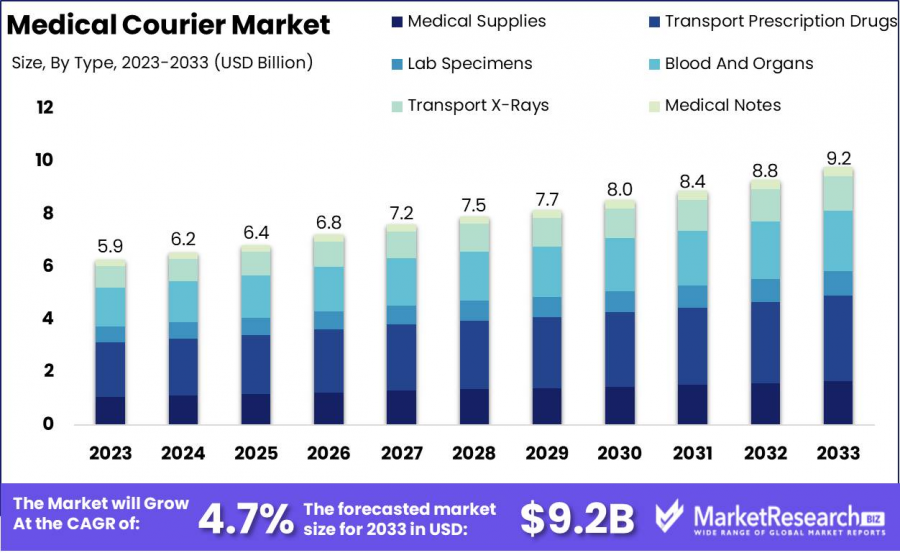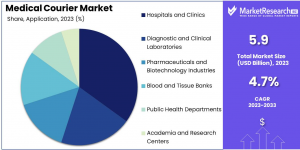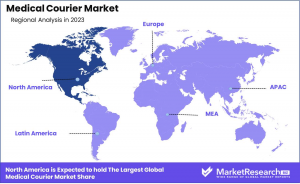
Medical Courier Market to Grow to USD 9.2 Billion by 2033, Driven by Rising Healthcare Logistics Demand
The Global Medical Courier Market was valued at USD 5.9 Bn in 2023. It is expected to reach USD 9.2 Bn by 2033, with a CAGR of 4.7%
NEW YORK, NY, UNITED STATES, February 13, 2025 /EINPresswire.com/ -- Overview
The Global Medical Courier Market was valued at USD 5.9 Bn in 2023. It is expected to reach USD 9.2 Bn by 2033, with a CAGR of 4.7% during the forecast period from 2024 to 2033.
The Global Medical Courier Market plays a critical role in healthcare logistics, ensuring the safe and timely transportation of biological samples, medical supplies, pharmaceuticals, and laboratory specimens. With the increasing demand for efficient healthcare supply chains, medical couriers provide essential support to hospitals, clinics, research centers, and diagnostic laboratories worldwide.
Advancements in real-time tracking, temperature-controlled transportation, and AI-driven logistics management have enhanced the reliability and efficiency of medical courier services. These innovations ensure strict regulatory compliance, minimize transit delays, and maintain the integrity of sensitive medical materials.
The growing adoption of home healthcare services, telemedicine, and the rising need for organ and blood transport are fueling market expansion. Regulatory bodies like the FDA, WHO, and ISO set stringent standards for handling medical shipments, ensuring safety and quality control.
With increasing healthcare demands and technological advancements, the medical courier industry continues to evolve, providing faster, more secure, and compliant delivery solutions. As healthcare logistics become more complex, medical couriers remain a crucial link in ensuring seamless and reliable medical supply transportation.
Click here to get a Sample report copy @ https://marketresearch.biz/report/medical-courier-market/request-sample/
Key Takeaways
•Market Size & Growth: The global medical courier market was valued at USD 5.9 billion in 2023 and is projected to reach USD 9.2 billion by 2033, growing at a CAGR of 4.7% from 2024 to 2033.
•By Type: Transporting prescription drugs leads the market with a 35% share, highlighting the growing demand for secure and timely medication delivery.
•By Application: Hospitals and clinics dominate, holding 40% of the market, driven by the frequent need for urgent medical supplies and specimen transport.
•Regional Insights: North America leads with a 45% market share, reflecting strong healthcare infrastructure and increasing demand for efficient medical logistics.
•Growth Opportunities: The market is expanding as healthcare organizations prioritize reliable transport solutions for time-sensitive medical specimens, pharmaceuticals, and supplies, ensuring compliance with strict regulatory standards.
Segmentation Analysis
•By Type Analysis: Transport Prescription Drugs led the medical courier market, accounting for over 35% of the market share in 2023. This dominance reflects the critical need for safe, timely, and regulatory-compliant delivery of pharmaceuticals to hospitals, pharmacies, and patients. Medical supplies logistics followed closely, ensuring the secure transport of medical equipment and consumables. Lab specimen couriers played a vital role in transporting biological samples and clinical trial materials, while blood and organ transport services remained essential for life-saving transplants and blood banks.
•By Application Analysis: Hospitals and Clinics dominated the medical courier market, holding a 35% share in 2023 due to their daily need for transporting medical supplies, specimens, and pharmaceuticals. Diagnostic and clinical laboratories relied heavily on couriers for biological sample transportation. Pharmaceutical and biotechnology companies required secure transport for drugs and biologics, while blood and tissue banks depended on specialized couriers for safe organ and blood transport. Additionally, public health departments and research institutions utilized medical couriers for disease surveillance, vaccine delivery, and scientific sample transportation.
Market Segments
By Type
•Medical Supplies
•Transport Prescription Drugs
•Lab Specimens
•Blood And Organs
•Transport X-Rays
•Medical Notes
By Application
•Hospitals and Clinics
•Diagnostic and Clinical Laboratories
•Pharmaceuticals and Biotechnology Industries
•Blood and Tissue Banks
•Public Health Departments
•Academia and Research Centers
To Purchase this Premium Report @ https://marketresearch.biz/purchase-report/?report_id=47803
Market Dynamics
•Driver: The increasing prevalence of chronic diseases necessitates frequent medical testing and timely delivery of medications. Medical courier services ensure that patients receive essential healthcare products promptly, supporting effective disease management. This demand is further amplified by the rise in home healthcare services, where timely delivery of medical supplies is crucial.
•Trend: The integration of digital technologies is transforming medical courier services. Real-time tracking systems and automated dispatching enhance operational efficiency and transparency. These advancements improve service reliability and allow healthcare providers to monitor deliveries, ensuring critical medical items reach their destinations safely and on time.
•Restraint: Strict regulatory requirements govern the transportation of medical products, including temperature control and secure handling protocols. Compliance with these standards can increase operational costs for courier services. Additionally, the risk of substandard and falsified medical products entering the supply chain necessitates rigorous quality assurance measures, further complicating logistics. citeturn0search0
•Opportunity: The expansion of telemedicine and remote patient monitoring creates a growing need for efficient medical courier services. As more patients receive care outside traditional healthcare settings, the demand for reliable delivery of medical supplies and specimens to and from patients' homes presents a significant growth opportunity for the medical courier market.
Market Key Players
•DHL International GmbH
•Cencora Inc.
•ERS Transition Ltd
•Send Direct Ltd
•Med Logistics Grp
•Blaze Express Courier Service
•Citysprint Ltd
•Affordable Courier Solutions Inc.
•Aylesford Couriers
•United Parcel Services
•FedEx Corp
•MNX Global Logistics
•Reliant Couriers & Haulage Ltd
•ZIPLINE International Inc
How Artificial Intelligence (AI) is Changing the Medical Courier Market?
•Route Optimization and Predictive Analytics: AI algorithms analyze traffic patterns, weather conditions, and delivery urgencies to determine the most efficient routes for couriers. This optimization reduces delivery times and fuel consumption, ensuring that critical medical items reach their destinations promptly. Predictive analytics further assist in anticipating demand surges, allowing for proactive resource allocation.
•Automation and Operational Efficiency: The integration of AI-driven automation in dispatching and inventory management streamlines operations. Automated dispatch systems assign deliveries based on real-time data, while AI monitors inventory levels to trigger timely restocking, minimizing delays in medical supply availability.
•Enhanced Compliance and Security: AI enhances compliance with healthcare regulations by maintaining secure digital records and monitoring the chain of custody during transportation. Advanced data encryption and real-time tracking ensure the confidentiality and integrity of sensitive medical information, aligning with standards such as HIPAA.
•Adoption of Autonomous Delivery Systems: AI-powered drones and autonomous vehicles are being utilized to deliver medical supplies, especially in remote or hard-to-reach areas. For instance, companies like Zipline have successfully implemented drone deliveries for medical products, significantly reducing delivery times and improving access to essential healthcare items.
Regional Analysis
North America holds a dominant 45% share in the global medical courier market, driven by a strong healthcare infrastructure, strict regulatory standards, and high demand for medical specimen transportation. The presence of specialized medical logistics providers ensures secure and timely delivery of sensitive healthcare materials.
Europe is another key market, supported by universal healthcare systems and an increasing need for efficient medical supply chain management. Countries like Germany, the UK, and France rely on medical couriers for hospital, laboratory, and pharmaceutical logistics.
Asia-Pacific is experiencing rapid market growth, fueled by rising healthcare investments, expanding laboratory networks, and improved healthcare infrastructure. Countries such as China, Japan, and India are witnessing a surge in demand for specialized medical courier services for transporting diagnostic specimens, pharmaceuticals, and medical equipment.
Middle East & Africa and Latin America hold smaller market shares but are growing steadily. Healthcare access improvements, expanding diagnostics, and logistical enhancements are key drivers in these regions, especially in remote and underserved areas.
Emerging Trends in Medical Courier Services
•Integration of Artificial Intelligence (AI): AI is increasingly utilized to optimize delivery routes, predict demand, and enhance supply chain efficiency in medical courier services. By analyzing vast amounts of data, AI systems can forecast the need for medical supplies and specimens, ensuring timely deliveries and reducing operational costs. This technological advancement leads to more reliable and efficient medical logistics.
•Adoption of Drone Technology: The use of drones for delivering essential medical supplies is gaining traction, especially in remote or hard-to-reach areas. A study conducted in Keylong, Himachal Pradesh, explored the feasibility of drone-based medical deliveries in extreme conditions, highlighting the potential for rapid and efficient transportation of medical goods.
•Enhanced Data Management: The implementation of Electronic Health Records (EHR) and other digital tools has improved the accuracy and efficiency of medical data processing. This advancement ensures safe and efficient transfer of confidential healthcare data, reducing medical errors and enhancing patient care.
Use Cases of Medical Courier Services
•Transportation of Laboratory Specimens: Medical couriers play a crucial role in transporting laboratory specimens from collection sites to diagnostic laboratories. For instance, during the COVID-19 pandemic, timely delivery of test samples was essential for prompt diagnosis and treatment. Efficient courier services ensured that samples reached laboratories quickly, facilitating rapid testing and response.
•Delivery of Prescription Medications: Medical couriers ensure that patients receive their prescription medications promptly, which is vital for managing chronic conditions. For example, patients with diabetes rely on timely deliveries of insulin and other supplies to manage their blood sugar levels effectively.
•Supply of Medical Equipment to Remote Areas: In underserved regions, medical couriers deliver essential medical equipment and supplies to healthcare facilities. This service ensures that even in remote locations, healthcare providers have the necessary tools to offer quality care. For instance, delivering ventilators and personal protective equipment to rural hospitals during health crises is a critical function of medical courier services.
Lawrence John
Prudour
+91 91308 55334
Lawrence@prudour.com
Distribution channels: Healthcare & Pharmaceuticals Industry
Legal Disclaimer:
EIN Presswire provides this news content "as is" without warranty of any kind. We do not accept any responsibility or liability for the accuracy, content, images, videos, licenses, completeness, legality, or reliability of the information contained in this article. If you have any complaints or copyright issues related to this article, kindly contact the author above.
Submit your press release


